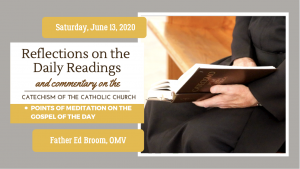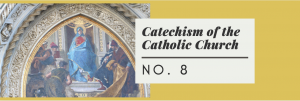
June 13, 2020
Memorial of Saint Anthony of Padua, Priest and Doctor of the Church
Reading 1 1 KGS 19:19-21
Elijah set out, and came upon Elisha, son of Shaphat,
as he was plowing with twelve yoke of oxen;
he was following the twelfth.
Elijah went over to him and threw his cloak over him.
Elisha left the oxen, ran after Elijah, and said,
“Please, let me kiss my father and mother goodbye,
and I will follow you.”
Elijah answered, “Go back!
Have I done anything to you?”
Elisha left him and, taking the yoke of oxen, slaughtered them;
he used the plowing equipment for fuel to boil their flesh,
and gave it to his people to eat.
Then he left and followed Elijah as his attendant.
Responsorial Psalm PSALM 16: 1B-2A, AND 5, 7-8, 9-10
R. (see 5a) You are my inheritance, O Lord.
Keep me, O God, for in you I take refuge;
I say to the LORD, “My Lord are you.”
O LORD, my allotted portion and my cup,
you it is who hold fast my lot.
R. You are my inheritance, O Lord.
I bless the LORD who counsels me;
even in the night my heart exhorts me.
I set the LORD ever before me;
with him at my right hand I shall not be disturbed.
R. You are my inheritance, O Lord.
Therefore my heart is glad and my soul rejoices,
my body, too, abides in confidence;
Because you will not abandon my soul to the nether world,
nor will you suffer your faithful one to undergo corruption.
R. You are my inheritance, O Lord.
Alleluia PS 119: 36A, 29B
R. Alleluia, alleluia.
Incline my heart, O God, to your decrees;
and favor me with your law.
R. Alleluia, alleluia.
Gospel MT 5:33-37
Jesus said to his disciples:
“You have heard that it was said to your ancestors,
Do not take a false oath,
but make good to the Lord all that you vow.
But I say to you, do not swear at all;
not by heaven, for it is God’s throne;
nor by the earth, for it is his footstool;
nor by Jerusalem, for it is the city of the great King.
Do not swear by your head,
for you cannot make a single hair white or black.
Let your ‘Yes’ mean ‘Yes,’ and your ‘No’ mean ‘No.’
Anything more is from the Evil One.”
 Catechism of the Catholic Church
Catechism of the Catholic Church
8 Periods of renewal in the Church are also intense moments of catechesis. In the great era of the Fathers of the Church, saintly bishops devoted an important part of their ministry to catechesis. St. Cyril of Jerusalem and St. John Chrysostom, St. Ambrose and St. Augustine, and many other Fathers wrote catechetical works that remain models for us.

“For greater things you were born.” (Ven. Mother Luisita)
SATURDAY, JUNE 13TH Mt: 5: 33-37 “Jesus said to his disciples… ‘Let your Yes mean Yes, and your No mean No. Anything more is from the evil one.’”
- In the pursuit of holiness, obedience is the sine qua non, meaning without which nothing. Without obedience there is no holiness! Holiness is obedience to God; sin is disobedience to God. We are here on this earth to say Yes to God and No to sin. This life is short, but our life hereafter is forever and ever and ever!
- CCC 397-398: Man, tempted by the devil, let his trust in his Creator die in his heart and, abusing his freedom, disobeyed God’s command. This is what man’s first sin consisted of. All subsequent sin would be disobedience toward God and lack of trust in His goodness. In that sin man preferred himself to God and by that very act scorned Him. He chose himself over and against God, against the requirements of his creaturely status, and therefore against his own good. Constituted in a state of holiness, man was destined to be fully “divinized” by God in glory. Seduced by the devil, he wanted to “be like God”, but “without God, before God, and not in accordance with God.”
- Jesus came as Savior to repair for the Original Sin of Adam and Eve, and for our sins. “For just as through the disobedience of the one man, the many were made sinners, so also through the obedience of the one man, the many will be made righteous.” (Rom 5:19)
- At the Last Supper, Jesus gave His last discourse to the apostles: “If you love me, keep my commands. And I will ask the Father, and he will give you another advocate to help you and be with you forever, the Spirit of truth. Anyone who loves me will obey my teaching. My Father will love them, and we will come to them and make our home with them. Anyone who does not love me will not obey my teaching.” (Jn 14: 15-16, 23-24)
- Jesus is the Son of God made man. He is one Person – the Second Person of the Blessed Trinity – with two natures, a Divine nature and a human nature. In His human nature, Jesus recoiled from the cross – in mortal agony He sweat blood in the Garden of Gethsemane! Yet He still obeyed! “Going a little farther, he fell with his face to the ground and prayed, ‘My Father, if it is possible, let this cup be taken from me. Yet not as I will, but as you will.’” (Mt 26:39)
- Could it be any clearer? Those who love Christ, strive to obey His teachings in Scripture and in His Holy Church. But it doesn’t stop there. Like Jesus in His agony in the Garden, we are to obey and say Yes to all that God in His Divine Providence and wisdom permits to happen every day and every moment in our lives. God wills good, but He permits evil to bring a greater good out of it. When we say “Jesus, I trust in you” we are saying Jesus, I trust in all you permit to happen in my life in this moment, this day, this year, and all my years.
Holy Obedience… by Father John Tauler, O.P.
The least little work done in holy obedience is nobler in God’s eyes and more worthy of reward than many great works performed by one’s own will. I declare to you in all truth that no lovelier offering can be made to the Almighty God than a truly humble and obedient heart. In a single instant a man can, by means of obedience and giving up of his own will to God, be made so humble that he will be led directly to God – more directly than if he spent ten years in practicing high devotions.
Obedience is that very noble virtue which is more pleasing to God than any of the others, even when we obey in matters which are in themselves of little moment. The eternal Son of God was, for our sake, made obedient to His heavenly Father – in His coming down from the Godhead to our poor human nature, in the embracing of His holy cross, and finally in His cruel and bitter death. Therefore, we must one and all be obedient to God in all divine things and human things, interiorly and exteriorly, without murmuring or contradiction – if God is to do His work of love unhindered and continuously within our souls.
End Father John Tauler, O.P. (+1361 – Rhineland mystic, priest and theologian)
Living Holy Obedience in daily life… by Venerable Madeleine Delbrel
We, the ordinary people of the streets, know very well that as long as our own will is alive, we will not be able to love Christ definitively. We know that only obedience can root us in His death. We would envy our Religious Brothers and Sisters if we too could not “die to ourselves” a little more each day.
However, for us the tiny circumstances of life are faithful “superiors.” They do not leave us alone for a moment; and the “yeses” we have to say to them follow continuously, one after the other. When we surrender to them without resistance, we find ourselves wonderfully liberated from ourselves. We float in Providence like a cork on the ocean waters.
From the moment we wake up these circumstances take hold of us. It is the telephone that rings; it is the key that won’t work, the bus that doesn’t arrive or arrives full, or doesn’t wait for us. It is the person sitting next to us who takes up the whole seat; or the vibration of the loose window pane that drives us crazy.
It’s the daily routine, one chore that leads to another, some job we wouldn’t have chosen. It’s the weather and its changes – which is exquisite precisely because it is completely untainted by human doing. It’s being cold, or being hot; it’s the headache or the toothache. It’s the people we meet and the conversations they choose to start. It’s the rude man who nearly knocks us off the sidewalk. It’s the people who need to kill some time, and so they corner us. When we live with others, obedience also means we set aside our own tastes and leave things in the place others have put them.
In this way, life becomes an epic film in slow motion. It does not make our head spin. It does not take our breath away. Little by little, thread by thread, it eats away at the old man’s frame, which cannot be mended and must be made new from the ground up. When we thus become accustomed to giving up our will to so many tiny things, we will no longer find it hard, when the occasion presents itself, to do the will of our boss, our husband, or our parents. And our hope is that death, too, will be easy.
End Venerable Madeleine Delbrel (+1964 – French Catholic writer and mystic)